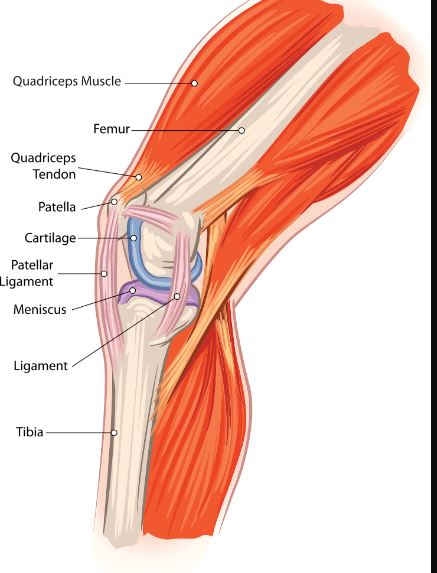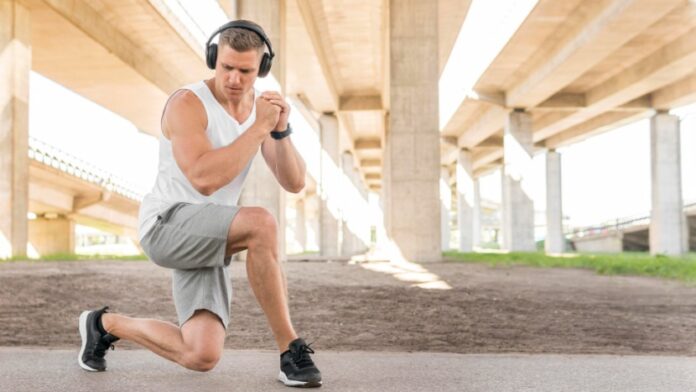If you have too much weight, it is not a good sign! Obesity leads to a lot of health complications. major is Knee and Hip Pain
With age, everybody’s body becomes weak, getting more susceptible to injuries and health problems, but people with excessive body fat lose their bodily vitality sooner than slim and fit human beings.
Are you wondering if your weight might be worsening your knee or hip pain? If yes, refer to the informative material below. Besides, also learn how you can reduce your weight.
Why do we have Knee and Hip pain at all?
When your joint gets inflamed due to some reason, it becomes painful, swollen, and tender. There could be various conditions that cause this Knee and Hip Pain problem of inflammation.
Knee Anatomy
Your knees are composed of various parts:
- Bones
- Cartilage
- Ligaments
- Tendons
- Muscles
- Joint Capsule

A knee joint has the femur, the tibia, and the patella. These are three bones, commonly called, thigh bone, shine bone, and kneecap.
Knee joints have two types of protective tissues, medically termed cartilage. These parts cushion the joints and serve to absorb the shock.
A ligament is a muscle strip that connects one bone to another. Your knee joint has four such connective tissues, ensuring stability and mobility. Technically, they are termed ACL, PCL, MCL, and LCL.
Tendons provide connections between bones and muscles. These are also strips of muscles like ligaments.
A knee joint also contains muscles, namely, the quadriceps and hamstrings. This helps in joint movement and flexibility.
The joint capsule is a part of the knee that is a liquid-filled bag. It serves to provide lubrication and nourishment for your joint.
Hip Anatomy
Your hip is a ball-and-socket joint. It has various parts like your knees. Consider the following:
- At the hip joint, the thigh and hip bones meet in a ball-and-socket form.
- Cartilage is also found in the hips to cushion the meeting bones for easy and frictionless movement.
- Synovium offers lubrication to the joint.
- Ligaments connect bones to bones, namely your thigh and hip bones.
- Tendons link muscles to the bones.
- Muscle: It helps in movement.
Why Knee and Hip Pain?
When any of these parts of your knees and hips get damaged, it results in painful joints. Many medical conditions can cause joint inflammation. Consider some of them below.
- ACL injury
- Fractures
- Patellar tendinitis
- Loose body
- Dislocated kneecap
- Hip or foot pain
- Torn meniscus
- Knee bursitis
- IIiotibial band syndrome
In short, any external trauma like road accidents or falls can injure the constituting structures of your joints like knees and hips causing you to feel the affected or traumatised area painful.
If you have been recommended replacement surgeries for your knee issues, your first responsibility must be to consult the right specialist. See you to ensure the best knee replacement hospital in Delhi or anywhere near you.
The link between obesity and joint pain
Does weight affect knee and hip pain? Yes, it does.
If you google about the same, you will get tons of information strongly pointing to the fact that there is a very intense relationship between being overweight and the intensification of joint pain.
In case you are fat and have been suffering from the condition of Osteoarthritis, your pain in the knees and hips will be more severe than any other person with a healthy weight suffering from the same medical condition.
A mass of research suggests that Obesity exacerbates the symptoms of OA as the weight-bearing joints are already damaged and along with that, they also have to tolerate the excessive fat above the waist when you walk, stand, or climb up and down the stairs, making your joints more damaged and making you feel that the pain is worsening.
Thus, if you are someone suffering from OA and obesity at the same time, reduce your weight. It will, in turn, help reduce the Knee and Hip Pain. Consider the following points to work on your condition of obesity.
Ways to Reduce Your Weight
Get some general tips below that will help improve your problem of obesity. However, for a more personalized approach, consulting a certified dietitian or medical authority is the most appreciated last resort.
Dietary changes:
Include more vegetables, fruit, or plant-based dishes in your diet. Cut back on carbohydrates and non-vegetarian foods. This will help curtail the accumulation of extra fat in your body.
However, reducing carbs or food rich in fat in the diet might leave you craving more meals. So, to subside these cravings, try having yogurt or buttermilk after a meal.
Incorporating sources rich in protein into your daily meals will also help feel fuller. Partly, it is true because protein-rich food contains substances that reduce the hunger hormone called ghrelin.
Furthermore, avoid as much junk food as possible. After a full meal, people often tend to binge on fast foods. This is a serious factor that contributes to your problem of obesity. Cut back on this thing and you will get noticeable improvements in your weight.
Besides, see if you have a sugar addiction. White sugar is the most unhealthy food item. Either keep the intake of white sugar to a minimum low or avoid it completely.
Intermittent fasting:
It is a way of dieting. People follow this way of fasting in several ways. Some of the most common variations are as follows.
- In a day, only eat within 8 hours while maintaining a fast for the remaining 16 hours. Within the window of 8 hours, you can have two meals.
- In a week, curtail your food intake to 600 calories for 2 days. And, stick to a healthy diet for the remainder of the week.
- Finally, you have the option where you can go without any food for the entire day or 24 hours. This is the typical fasting technique observed mostly across India, especially for a religious cause but it has health benefits as well.
Regular exercise:
There are various kinds of exercise, but for joints, you have to follow a good strength and endurance routine. Some exercises include How to Strengthen Knee Ligaments ?
Regular and correct exercise will strengthen the healthy muscle mass around your knee and hip joints providing necessary protection during externally traumatizing situations, circumstances, or events.
Adequate sleep:
Daily, our body goes through a lot of wear and tear because of daily functioning like walking, running, climbing the stairs, etc. This natural physiological degeneration often gets rejuvenated and repaired during deep sleep. So, having enough sleep is crucial for healthy knees.
Excessive stress:
The National Library of Medicine says, “Chronic knee pain (CKP) can degrade the quality of life and cause dysfunction, resulting in the loss of independence. Psychological stress not only affects physical and mental health but is also a risk factor for CKP.”
It means taking too much stress will make your OA worse. You will feel more pain, swelling, and stiffness.
Things to avoid if you have Knee and Hip Pain
If you have joint pain in the knees and hips, consider the following options to avoid and know how to relieve knee and hip pain .
Don’t eat more than necessary:
If your knees or hips are painful, keep your eating in check. If you have the problem of excessive eating, it will lead you to gain too much fat over time.
This behavior will make your knee pain worse as too much weight will put extra pressure on your joints while doing normal day-to-day activities.
Overexercise might hurt:
People having painful knees or hips shouldn’t over-exercise. It can make the situation more painful and inflamed. However, in the case of OA, mild stretching or walking might help with the morning stiffness.
Don’t have too many painkillers:
Are you a patient with Osteoarthritis? If yes, painful knees or hips are a common thing you have to deal with. So, in that case, make sure you don’t overdo painkillers.
For a drug-free option, consider physiotherapy. Here, the trained physiotherapist will try to reduce your joint stiffness and pain with heat, exercise, and massage.
See the right orthopedic doctor:
If you don’t know why your knees are so hurtful, get a medical opinion from the best specialist. It is crucial because only after the best diagnosis, your knee pain can be handled best. Consult the best hip pain doctor in Delhi.
